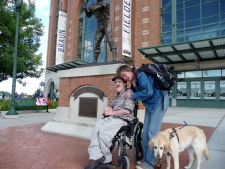Opinion: Why Reopening Early Frightens Me
by Beth

Looking forward to our next Brewers game together, but we’re willing to wait.
Regular blog readers know about our son Gus – he was born with a rare genetic condition that left him with pretty severe developmental and physical disabilities. Since 2002, Gus has lived in a group home with three other guys in Watertown, Wisconsin. My husband Mike and I live in Chicago. Normally we get up north to visit Gus about once a month, but his group home has set up strict guidelines — no visitors. As difficult as this has been for all of us, we are comforted that our son is in good hands with people who have been going out of their way to keep a pretty vulnerable group of clients safe and healthy.
All the Direct Service Professionals (DSPs)—at his group home – those are the people who do the hard work of caring for people like Gus –are following strict PPE and cleaning protocols. The DSPs also took pledges to limit their own contacts outside of work. So while we’ve missed our visits with Gus, we haven’t been worried about his general welfare.
Until last Wednesday.
That’s when the Wisconsin Supreme Court struck down the state’s stay-at-home order. That ruling meant some businesses and restaurants could open immediately. The group home Gus lives in is in Jefferson County, halfway between Milwaukee and Dane County.
So here’s what I’m worried about: re-opening early means more community exposure. Staff coming in and out of the group home are more likely to unwittingly spread the coronavirus to Gus and his roommates, and people with disabilities of any age are more likely to have underlying health conditions that put them at greater risk of serious complications and death if exposed to the virus. A Wisconsin Public Radio story earlier this week reported that before last Wednesday’s ruling 32 state and national groups filed a brief laying out the increased risks of COVID-19 infection for communities of people who are older and/or have disabilities. From that story:
Many people from these communities live in long term care facilities and group homes, the brief notes, where there’s a higher risk that infections can spread. Plus, caregivers who provide in-person care and services are not able to social distance, and a shortage of personal protective equipment could put that caregiving workforce and their clients at risk.
The people who work with Gus and his roommates are often referred to as heroes. Rules or no rules, I hope we can honor them by doing all we can, including staying at home a bit longer, to keep them safe.






